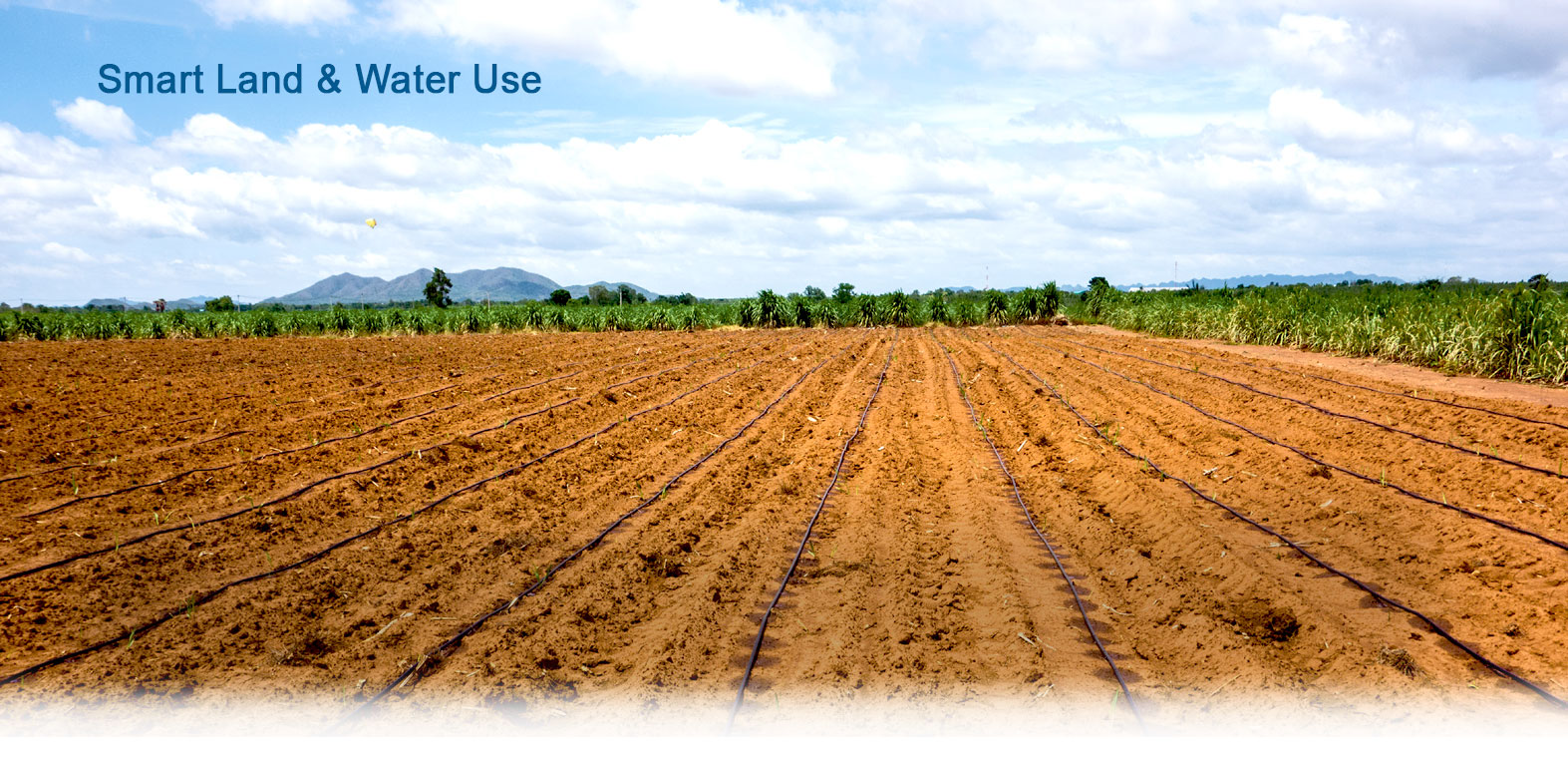Welcome to Jain Irrigation Systems Ltd.

Blog at Jains - MAKING ‘CLIMATE – SMART AGRICULTURE’ by EFFICIENT LAND AND WATER USE

Our agribusiness model is designed on the concept of ‘resource to roots,’ which not only addresses the water, energy, and food security, but especially helps smallholder farmers improve their incomes significantly
– ANIL JAIN, CHIEF EXECUTIVE OFFICER
We were interested in using water footprinting to evaluate the water consumption patterns and to quantify savings associated with the micro-irrigation products as compared to traditional flood irrigation. In collaboration with IFC who helped analyse the development of water footprinting to reduce water consumption and associated social and environmental impacts. Hence, the study is done on WATER FOOTPRINT REDUCTION THROUGH DRIP IRRIGATION.
The Study and its findings are well documented by IFC in its study report - MAKING AGRICULTURE CLIMATE SMART - A Business Perspective from South Asia; Executive Summary of the JISL case study envisaged as below:
International Finance Corporation (IFC), a member of the World Bank Group, is the largest global development institution focused exclusively on leveraging the power of the private sector to tackle the world’s most pressing development challenges. Working with private enterprises in more than 100 countries, IFC uses its capital, expertise, and influence to help eliminate extreme poverty and promote shared prosperity.
The study on Climate-Smart Agriculture is an integrated approach to managing food-producing landscapes – cropland, livestock, forests, and fisheries – that addresses the interconnected challenges of food security and climate change. Climate-smart agriculture promotes a set of practices and business models that can help reduce emissions and build resilience. It aims to address both food insecurity and climate change by improving resistance to climate impacts, reducing greenhouse emissions, and increasing farm productivity. IFC provides investments and advice that contribute to the three pillars of climate-smart agriculture.
And one of the pillars of their study is smart land and water use that assists farmers in growing more food with fewer inputs through innovative practices such as precision agriculture, efficient irrigation, and reducing the amount of fertilizer used.
THE CHALLENGE
Vegetable and fruit farming in India is predominantly done by smallholders, especially women farmers. In large parts of the country, particularly South India, there are increasing water shortages due to erratic rains caused by climate change and unsustainable groundwater usage in order to meet agricultural, industrial, and domestic water demands. The limited availability of water constrains smallholders’ ability to produce and supply buyers such as Jain Farm Fresh Foods Limited.
THE SOLUTION
The company has worked tirelessly to promote its ‘more crop per drop’ vision of irrigation. Through a detailed study of the interrelationship between soil, water, crops, terrain, and related agro-climatic conditions, it has designed a viable system (micro-irrigation system) to deliver measured quantities of water at the roots of plants at regular intervals. In collaboration with IFC, Jain Irrigation Sys Ltd (JISL) initiated India’s first corporate water interest in the agribusiness sector when they tested growing dehydrated onions with and without drip irrigation in the Tapi River basin in North Central Maharashtra. The accounting results are:
- Water consumed at the farms accounts for 99% of the total water footprint of dehydrated onions.
- Onions grown under drip irrigation have a 42% smaller water footprint than onions grown under flood irrigation
- The grey water footprint for onions grown under drip irrigation is almost 90% smaller than the grey water footprint for flood-irrigated onions,
- The water footprint of MIS (drip irrigation) used on a typical onion field is a negligible component of the total water footprint for growing onions
- The water consumption associated with JISL’s production of dehydrated onions and MIS accounts for approximately 1% of total groundwater draft in the Jalgaon District.
RESULTS
There have been other on-farm benefits as well from the use of micro-irrigation systems. For instance,
- The efficiency of fertilizer use has increased by 30% due to fertigation through drip irrigation systems.
- The crop Yields in most cases have increased by over 50 to 100% when the crop was well-tended.
- Given the positive on-farm results from the use of micro-irrigation systems, the company has been able to convert 500,000 farmers, including 50,000 women farmers, to drip irrigation, making it the dominant player in the Indian micro-irrigation market.
- Furthermore, while working with smallholders, the company realized that the cost of compliance with international supply chain standards such as GLOBAL G.A.P. was very high.
- In collaboration with IFC, the company developed a simpler version of GLOBAL G.A.P referred to as Jain G.A.P. To implement Jain G.A.P., smallholders have been provided with assistance on soil water management to reduce input usage, technical agronomy extension support for cultivating improved varieties for higher yields, containers for safe storage of pesticides, first-aid kits on farms, personal protective equipment, requisite training for use of such equipment and a manual for data keeping. The company has mainstreamed Jain G.A.P. as an intermediate standard to improve farm yield, adopt climate-smart agriculture practices and increase hygiene and sanitation on farms.
- The company has also had a positive effect on food safety, worker welfare, wildlife and biodiversity conservation.
- In 2017-2018, the company intends to increase the area Jain G.A.P. by 10,000 acres of white onions, 3,000 acres of mangoes, and 2,700 acres of bananas. The company has sourced over 165,000 metric tons of Jain G.A.P.-certified white onions, 53,000 metric tons of bananas, and 17,000 metric tons of mangoes to process and sell globally to institutional buyers, resulting in up to a 70% reduction in irrigation water requirements due to micro-irrigation systems and bringing irrigated agriculture to additional land.
These approaches address both water demand and water supply. We address very local applications (for local onion suppliers in Jalgaon) as well as applications that can make an impact on a regional and national level. Drip irrigation was highlighted as a key vector to addressing the projected deficit between supply and water requirements in India in the recent report, Charting Our Water Future (2030 Water Resources Group, 2009). JISL’s water footprint response strategies also provide a strong foundation for resilience in the face of climate change, and for sustainably meeting the growing global demand for food. As such, these approaches are of global importance as examples of a significant corporate response to agricultural water scarcity.
A CASE STUDY on JAIN IRRIGATION SYSTEMS LIMITED Published by IFC-INTERNATIONAL FINANCE CORPORATION


